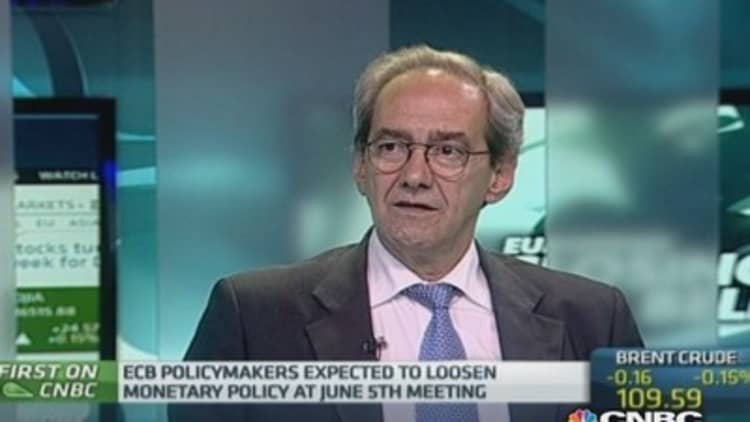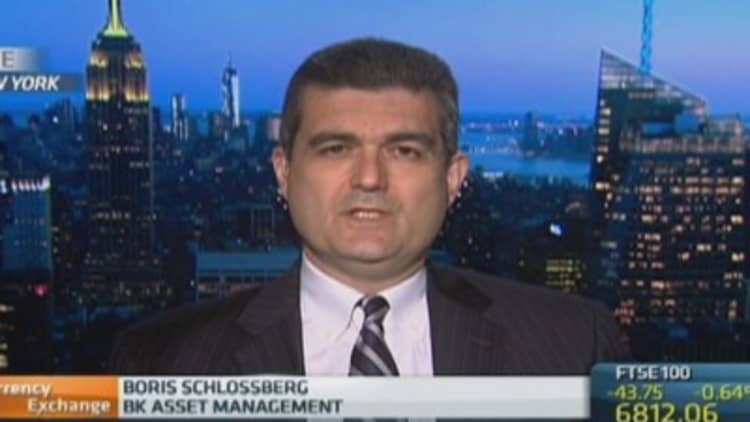Expectations the ECB will "shock and awe" the market with a package of easing measures next month has pushed the euro lower, but some analysts worry one of those potential moves - a negative deposit rate - could backfire.
"The ECB has talked about it for the last 18 months," said Mark Wall, co-head of European economics at Deutsche Bank. "It's almost like they're afraid to implement it. But they've waved it around like a loaded gun so often when it suited their purpose saying, 'we could do this.'"
The deposit rate is already at zero. Many analysts expect a 10 basis-point cut in the rate, meaning the ECB would effectively charge banks for parking their money at the central bank rather than lending it.
Read More ECB readies package of rate cuts and targeted measures

Wall believes a negative rate could be "self-defeating," noting that while central banks haven't used it broadly, the experience in Denmark, one of the few countries to implement it, was unsuccessful.
The ECB is considering broader easing measures as Europe's economic recovery has been bedeviled in part by a strong euro keeping inflation at worryingly low levels and damping exports. Annual inflation in the 18-member euro zone picked up slightly in April to 0.7 percent, but remains way off the ECB's target of close to 2 percent. Risk aversion has made banks unwilling to lend, which has also weighed on the economy.
Read More Will the ECB's euro bashing work?
But when Denmark implemented the policy, banks were unwilling to pass the negative deposit rate to their customers, squeezing their margins, Wall noted. At the same time, to deal with the added expense, some banks increased their lending rates, which was counterproductive to the central bank's objectives, he said.
In addition, negative deposit rates might also counter-intuitively strengthen, rather than weaken, the euro, if it encourages investors to move toward peripheral-country investments to pick up yield spread, he said.
Read More IMF calls on ECB to act amid 'low-flation'
"That could attract capital flows in from outside the eurozone to take advantage of that, which might frustrate the objective of weakening the currency," Wall said.
Deutsche Bank isn't alone in doubting the effectiveness of a negative deposit rate.
"We are not convinced by the merits of a negative deposit rate, particularly given that it is unclear what this move is trying to achieve" ANZ said in a note Tuesday.

"If it is to encourage banks to lend more, then we doubt this would be the best approach," it said. "If it is to limit the rise of the euro, then it is questionable this would have a lasting impact."
ANZ expects a negative deposit rate would actually discourage foreign capital inflows into the euro area.
"The timing is not ideal given domestic banks are currently focused on improving their capital ratios. This foreign flow is much needed to support euro area growth," it said. ANZ doesn't expect the ECB will adopt the policy.
Read More Weaker inflation could prompt broad ECB asset-buying
Similarly, Credit Agricole is "skeptical," of the policy, adding it is only giving a 50 percent chance it will be announced at the ECB's June meeting.
"Negative rates could have unintended consequences while providing little boost to bank lending," Credit Agricole said in a note Monday.
"We are confident the ECB would find ways to make this mitigate the consequences of negative rates, while not all banks would increase lending rates to compensate for the lost margins," Credit Agricole said. "We are less confident that a negative rate in itself would provide a substantial stimulus for the real economy, except for the indirect effect of a weaker currency, which could be a clear positive."
—By CNBC.Com's Leslie Shaffer; Follow her on Twitter @LeslieShaffer1

